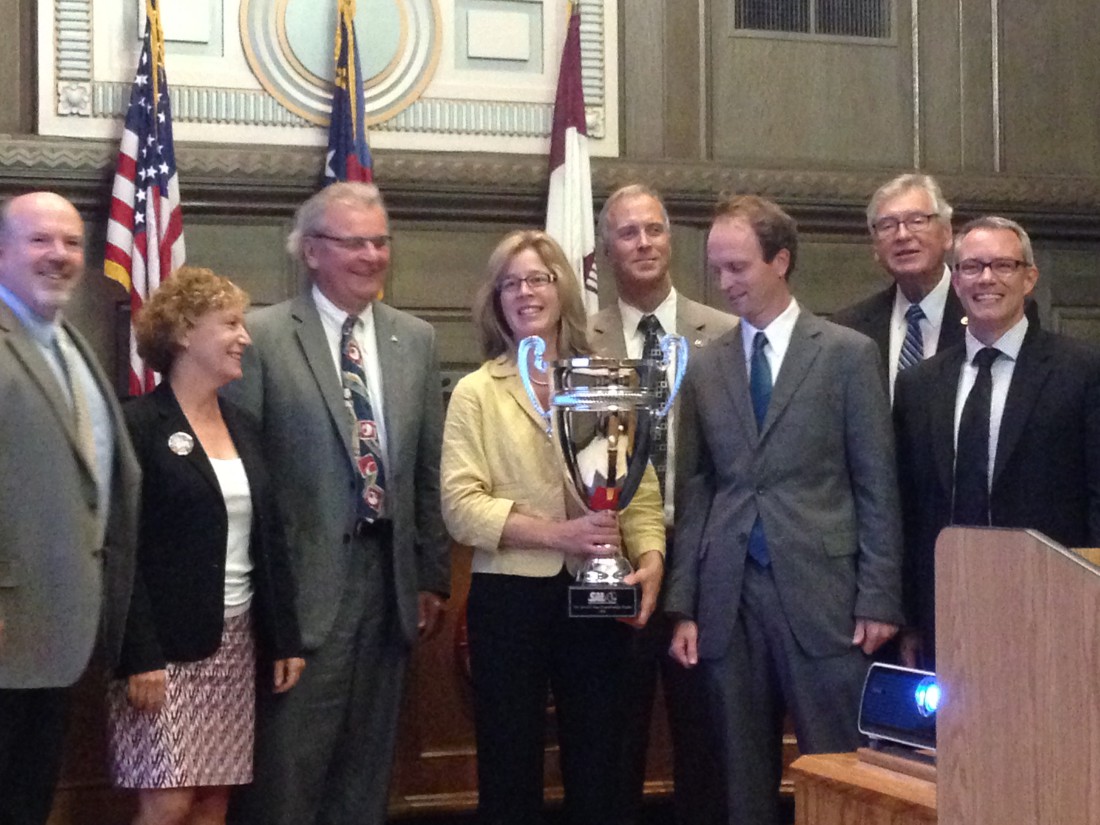Today, Oct. 14, Asheville City Council approved the creation of three municipal service districts (MSD) as a way to finance redevelopment and infrastructural improvements.
The three MSDs — what city officials are calling “innovation districts” — will be in the River Arts District, the South Slope Extension and Charlotte Street Corridor.
“The areas that have been selected have the opportunity to have a return on investment,” said Cathy Ball, executive director of Planning & Multimodal Transportation. “When you look at these specific areas, there’s a lot of vacant property. There’s a lot of underutilized properties. So the redevelopment of these pieces of property has the ability to add to the city’s tax base for the whole community. It’s generating revenue that can be use for maintenance or throughout the whole city.”
Ideally, says Ball, the move will “increase the health of people living in those communities, [raise] community satisfaction, job creation, and frankly [create] just happier people.”
Creating the innovation districts allows the city to use low-risk special obligation bonds to finance projects such as greenways, Riverside Drive improvements, redevelopment and transportation upgrades in the River Arts District, and the redevelopment of Lee Walker Heights, Asheville oldest public housing complex, in the South Slope Extension.
The one downside is the possible of increasing taxes for the people in the innovation districts, which designation as an MSD also allows, but Council members Cecil Bothwell, Jan Davis and Gordon Smith said, one after another, that this was not an issue.
“I opposed the downtown BID [Business Improvement District, the city’s only current MSD], because it included the special tax on the people in that area and a non-elected body to administer those taxes,” said Bothwell. “We’re not doing either of those things. Although it does leave it open for a future Council to impose higher taxes, I’m still pretty comfortable supporting this.”
“I probably should emphasize what Councilman Bothwell just said,” said Davis. “This does not impose a special tax on people in this district, at least at this time. Hopefully, the return on investment will generate cash flow and make [each district] a better place to be.”
“To re-emphasize the points made by Councilman Bothwell and Davis,” said Smith, “the reason we’re doing these is to be able to receive those special obligation bonds to make infrastructure improvements rather than doing property tax increases. This is a different way coming at those infrastructure needs.”
Motions for all districts passed 7-0.
IN OTHER BUSINESS
- Council honored a request to defer the public hearing regarding a proposed rezoning on Sardis Road that would open the way for Greymont Village, an apartment complex. The rezoning, which first came before Council on Sept. 9, was punted to Oct. 14 because the developer was reluctant to meet two demands from the Council, namely committing to workforce housing units and the fire suppression system. The public hearing has been deferred to Tuesday, Dec. 9.
- Council also approved two budget amendments that pave the way for a re-engineering of the city workforce. Asheville is receiving more revenue from development, providing, at minimum, a $300,000 windfall. This money will go to addressing retention in the Development Services Department, create two new department-specific consultant positions in the Human Resources Department and add another person to the Office of Public Engagement, allowing those employees to be embedded in certain departments on a rotating basis. The Council also approved $200,000 in excess cash to pay for a compensation and classification study of the city workforce.
- Council also made three proclamations — Food Day, Sister Cities Month, and special recognition for the Asheville Tourists, who won the 2014 South Atlantic League Championship and brought home an enormous trophy, which team owner Brian DeWine brought to Council’s meeting.




The South Slope extension is a fraud. The area in this new district is entirely south of Southside Ave.
If the council is so concerned about infrastructure why not address the often promised/never completed project to move downtown utilities underground? You know, the area where all the people are that generates all the taxes? The one where handicapped people can’t get around because of poles in the middle of sidewalks?